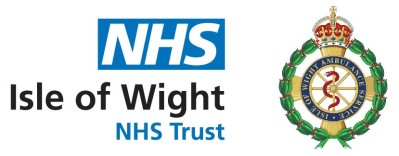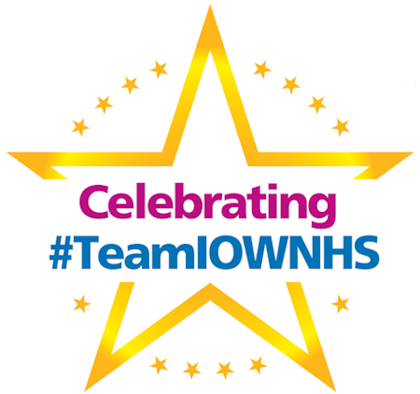Modern Slavery & Human Trafficking Statement 2023 - 2024
Background
In 2023, Isle of Wight NHS Trust (IWT) further strengthened its partnership with Portsmouth Hospitals University NHS Trust (PHU) by forming an NHS Group. The Group is not a merger but will enable greater collaboration between our 2 organisations.
By working together, we hope to provide and improve services across our sites allowing our patients to benefit from the knowledge and expertise held in both trusts. We have put in place a leadership structure to enable a focus on joint working to plan for the changes required for clinical and financial sustainability as well as leading day-to-day delivery in each of our trusts.
We remain 2 separate statutory organisations with an overarching executive team, supported by dedicated leadership teams for both PHU and IWT, each headed by a chief officer. They align the strategic direction and transformation work across our 2 organisations and together with the trust leadership teams, oversee the delivery of each operating plan and strategy. In 2023/24, PHU continued to have some executive directors who were board members of only one trust.
Our board committees, all chaired by a non-executive director and reporting to the Board, provide strengthened oversight and management of planning, performance and risk. More details about our board and committees can be found in our Annual Report. Our leadership team, which includes both executive directors and divisional directors, ensures good governance across our organisation.
The boards and committees meet in common and have agreed to produce a combined statement for the NHS Group on behalf of PHU and IWT.
1.Introduction
Modern slavery can take many forms including slavery, servitude and forced or compulsory labour and human trafficking. The Modern Slavery Act 2015 is an Act of the Parliament of the United Kingdom designed to combat modern slavery in the UK.
Section 54 (Transparency in Supply Chains) of the Modern Slavery Act 2015 requires all commercial operations in the UK with a turnover in excess of £36million to publish an annual statement setting out the steps they take to prevent modern slavery in their business and their supply chains.
Both PHU and IWT have a zero-tolerance approach to any form of modern slavery, and this statement sets out the steps both organisations have taken during the financial year 2023 / 2024 and are continuing to take to ensure that modern slavery and human trafficking is not taking place within our business or supply chain.
All members of staff within both organisations have a personal responsibility for the successful prevention of modern slavery and human trafficking, with the Procurement Department taking a lead responsibility for compliance in the supply chain.
Both PHU and IWT are committed to acting ethically, with integrity and transparency in all business dealings, and putting effective systems in place to safeguard against modern slavery taking place within the business or our supply chain.
2. Organisation structure, business and supply chains Isle of Wight NHS Trust (IWT)
The Isle of Wight NHS Trust was established in April 2012 as the only fully integrated provider of health services to an isolated offshore population of 140,000.
Community, mental health and learning disabilities services transferred to Hampshire & Isle of Wight Healthcare NHS Foundation Trust on 1st May 2024.
Following an inspection by the Care Quality Commission in 2021 we received an overall rating of ‘Good’.
Acute hospital care
Based at the heart of the Island, with 266 beds and handling around 27,000 admissions each year, St Mary’s Hospital in Newport is our main base for delivering acute services for the Island’s population. Services include the Emergency Department (A&E), the Urgent Treatment Centre by referral only, emergency medicine and surgery, planned surgery, intensive care, comprehensive maternity, Special Care Baby Unit (SCBU) and paediatric services with 986 births last year.
Ambulance service
Isle of Wight Ambulance Service (IWAS) is part of Isle of Wight NHS Trust.
The service encompasses the Clinical Co-ordination Centre, frontline operations, Patient Transport Service, education and training, and Emergency Preparedness, Resilience and Response (EPRR), for an Island population of around 140,000 people.
Portsmouth Hospitals NHS Trust (PHU)
PHU is proud to provide expert, compassionate care. It cares for its local population of about 675,000 residents across Portsmouth and south east Hampshire and many people beyond.
It offers a full range of hospital services from its main site at Queen Alexandra Hospital in Portsmouth and a range of outpatient and diagnostic facilities at community sites and local treatment centres across Portsmouth and south east Hampshire. These include:
- St Mary’s Hospital – midwifery, dermatology and disablement services
- Gosport War Memorial Hospital – a range of services including Blake Maternity Unit, and Minor Injuries Unit and diagnostics
- Petersfield Community Hospital – The Grange Maternity Unit
PHU is a regional cancer centre and also provides some tertiary services to a catchment area of more than 2M people. This includes the Wessex Kidney Service.
It is proud to host the country’s largest Ministry of Defence Hospital Unit, Joint Hospitals Group South, treating current and former members of the armed forces and their families and training clinicians.
It has a reputation for award-winning research and development and pioneers new medical advances to benefit patients.
Following an inspection by the Care Quality Commission in 2022, PHU retained its overall rating of ‘Good’.
3. Policies in relation to slavery and human trafficking
Both organisations have several internal policies to ensure that we are conducting our business in an ethical and transparent manner. These include:
- Recruitment and Selection Policy: We operate robust recruitment policies, including eligibility to work in the UK checks for all directly employed staff. Audits are undertaken by the approved framework for all agency workers engaged via approved frameworks to provide assurance that pre-employment clearance has been obtained for agency staff, to safeguard against human trafficking or individuals being forced to work against their will. We also require external agencies supplying temporary staff to demonstrate compliance with the legislation. Our Overseas Recruitment Teams have robust systems and processes in place for ensuring that overseas recruitment complies with modern slavery and human trafficking laws.
- Equal opportunities: We have a range of controls to protect staff from poor treatment and/or exploitation, which complies with all respective laws and regulations. These include provision of fair pay rates, fair terms and conditions of employment and access to training and development opportunities.
- Safeguarding policies: We adhere to the principles inherent both within our safeguarding child and adult policies. These provide clear guidance to ensure our employees are clear on how to raise safeguarding concerns about how colleagues or people receiving our services are being treated, or about practices within our business or supply chain.
- Freedom to Speak Up (Whistle Blowing) Policy: Both trusts have updated their Freedom to Speak up Policies to reflect and align to the National Freedom to Speak Up Policy for the NHS. The policies ensure all employees know that they can raise concerns about how colleagues or people receiving our services are being treated, or about practices within our business or supply chain, without fear of reprisals, and how to raise these concerns.
- Standards of business conduct: this NHS code explains the way we behave as organisations and how we expect our employees and suppliers to act.
4. Due diligence processes in relation to slavery and human trafficking
The Trust’s Procurement and Supply Chain Team is guided by current legislation and government guidance. These include:
- Comply with the Public Contract Regulations 2015(PCR) and The Health Care Services (Provider Selection Regime) Regulations 2023, including application of the mandatory and discretionary exclusion grounds relating to modern slavery under Reg 57 PCR.
- Use the CCS Standard Selection Questionnaire which asks suppliers to confirm their compliance with s.54 of the Modern Slavery Act 2015
- Include PPN06/20 Social Value Model requirements within our tenders (one of the policy outcomes is on identifying and managing the risks of modern slavery)
- Use the standard NHS Terms and Conditions when procuring goods and services, which include several requirements and obligations on suppliers in relation to modern slavery.
We undertake appropriate pre-employment checks and require our agencies on approved frameworks to do the same. We protect staff from poor treatment and/or exploitation and comply with all respective laws and regulations including fair pay rates and terms of conditions of employment. We consult and negotiate with Trade Unions on proposed changes to employment, work organisation, and contractual relations.
Our Freedom to Speak Up (FTSU) Guardian supports people to raise and manage concerns in a confidential, supportive and anonymised manner, with appropriate signposting. This is a key role in promoting an open and honest culture of listening and learning, so that concerns raised are acted upon in a fair manner, and the speak up function is being actively promoted across the Trust. The FTSU Guardian is also connected to a regional network of FTSU Guardians and has links with the ‘Respect Me’ service, staff networks and ‘whistleblowing’ line.
The FTSU Guardians have developed a broad network of FTSU Advocates throughout both organisations to ensure that staff have access to signposting support. We continue to raise awareness of ‘Freedom to Speak Up’ across both organisations and have implemented the Health Education England Freedom to speak up training modules ‘speak up, listen up and follow up’ ensuring these form part of ‘essential/mandatory training’.
Both PHU and IWT have updated their FTSU policies to reflect the national guidance.
IWT also has CARE Ambassadors who, as well as fulfilling the role of the FTSU Advocates promote wellbeing and inclusion. They take the speak up, listen up and follow up training, which is being promoted widely to all staff.
The FTSU Guardians have a confidential email address, and the development of an online reporting portal also allows staff, regardless of area or shift pattern to raise a confidential concern anonymously if required. The FTSU policy has been reviewed to ensure that it meets the requirements of the standardised national policy for Freedom to Speak Up.
The trust has a specialist Safeguarding Team which supports both organisations to ensure that we have robust safeguarding arrangements across all areas. This includes responding to allegations of abuse of patients, staff and the wider public and sharing concerns where appropriate with partner organisations.
PHU has an allegations management policy to respond to allegations relating to any member of staff which indicate they may be unsuitable to work with adults or children, and works closely with statutory bodies and professional bodies. Management of Allegations is included in the Persons in Positions of Trust (PiPOT) Policy in IWT, which provides a clear framework for managing cases where allegations have been made against a Person in Position of Trust (PiPoT), focusing on the management of risk and provides guidance to ensure appropriate actions are taken in relation to recognising, reporting, recording and responding to incidents..
5. Risk assessment and management
We have robust policies detailing how the trusts effectively manage risks. Our aim is to promote a risk awareness culture in which all risks are identified, assessed, understood and proactively managed. This will promote a way of working that ensures risk management is embedded in the trusts’ culture and becomes an integral part of each trust’s objectives, plans, practices and management systems including in relation to assessment and management of modern slavery and human trafficking risks.
6. Key performance indicators to measure effectiveness of steps being taken
- KPI 1 - Requirement for Procurement staff to complete annual training on modern slavery.
- KPI 2 - Reporting any suspected modern slavery violations to an Executive Director immediately upon detection and investigating the reports within 72 hours.
- KPI 3 - Modern Slavery Assessment Tool will be completed for all new requirements over £2m which are assessed as medium to high risk of Modern Slavery.
- KPI 4 - Documented evidence of Modern Slavery as a standing Agenda item with Supplier Relationship meeting on a quarterly basis.
- KPI 5 - The recruitment process for substantive staff is audited on a regular basis (average every two years), by the Trust’s auditors. This includes pre-employment checks and the rights to work in the UK.
- KPI 6 - Monitoring of incidents and Freedom to Speak Up themes to identify any concerns relating to modern slavery.
7. Training on modern slavery and trafficking
IWT training is provided as part of the mandatory training package. Equality, Diversity and Human Rights training, Safeguarding Adults training, Safeguarding Children training, and Prevention of Radicalisation training all include role relevant modern slavery awareness, and staff are required to complete the courses every three years (except for Equality, Diversity and Human Rights training, which is completed once during the onboarding process).
PHU training is provided as part of safeguarding training.
Further support and resources on modern slavery and human trafficking is available in both organisations on the staff intranet.
Staff in both organisations are able to access training provided by our Multi-agency Children’s Partnerships and Safeguarding Adults Boards.
We have specialist safeguarding adult and children teams, whom staff can contact for support with reporting of concerns and who will train staff on how to recognise issues of concern and the actions they need to take when they identify any concerns.
8. Review of effectiveness
In 2023 / 24, no concerns were identified by either trust or brought to either trust’s attention indicating non-compliance with the Modern Slavery Act 2015.
Both trusts intend to continue to take further steps to identify, assess and monitor potential risk areas in terms of modern slavery and human trafficking, particularly in our supply chains. In 2024/25, our anti- slavery programme will include:
- Continuing to effectively monitor our contracts and supply chain to ensure that new and existing suppliers are compliant with the Modern Slavery Act 2015.
- Continuing to have robust recruitment systems and processes in place including for overseas recruitment and temporary workers.
- Strengthening our FTSU processes to ensure all staff feel confident and safe to raise concerns.
- Work with partners such the local councils and the police, as required, to ensure robust procedures are in place.
- Continuing to deliver safeguarding training and specialist support for all our staff; and implementing any new guidance or best practice.
- Continue on our maturity journey as an NHS Group through further alignment in both trusts’ policies and approaches.
- Review and alignment of training covering modern slavery in both Trusts to learn from each other and ensure we have the best approach in bout our Trusts.
9. Trust Board of Directors Approval
The statement is made pursuant to section 54(1) of the Modern Slavery Act 2015 and constitutes both PHU and IWT slavery and human trafficking statement. The Boards-in-Common have considered and approved this statement 31 July 2024 and will continue to support the requirements of the legislation.
10. Reporting and Signposting
If you suspect someone could be a victim of modern slavery, contact Isle of Wight Police on 999, 101 or through the Hampshire Constabulary website: Home | Hampshire Constabulary
Alternative contacts, available 24 hours a day, 365 days a year:
- The Modern Slavery Helpline, via 08000 121 700 or www.
modernslaveryhelpline.org/ report
- Crime Stoppers, via 0800 555 111 or www.crimestoppers-uk.org
- The Salvation Army’s confidential referral hotline, via 0800 808 3733 or www.
salvationarmy.org.uk/ modern-slavery



